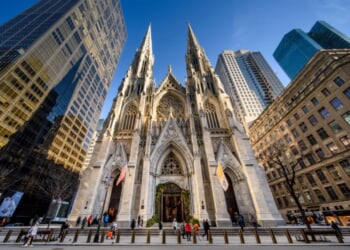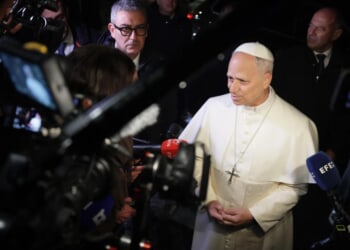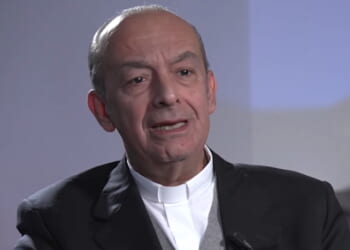
We are in the Jubilee Year of Hope, but do we really understand what hope is?
When we “hope,” we wish for or desire something. We hope for good weather, or we hope that someone has a happy birthday. But a proper end necessarily belongs to the virtue of hope, for it always has an object, meaning we always hope for something. And we can either hope for something worthy of our desire or not.
The world gives us plenty of false hopes: hope in politicians, in wealth, in academic degrees, in careers, in technology, in progress…and in ourselves. These hopes find their beginnings and ends in this world, with no consideration of the soul or the Kingdom of Heaven. These hopes disappoint. We can see this demonstrated in the increasing number of depressed, anxious, and lonely people, because placing one’s hope in other flawed people or in material things cannot bring lasting fulfillment or joy.
As Catholics, we know that our hope is most properly placed in Jesus.
The Catholic meaning of hope is something much greater than the meaning of hope in the world. The Catechism of the Catholic Church teaches: “Hope is the theological virtue by which we desire the kingdom of heaven and eternal life as our happiness, placing our trust in Christ’s promises and relying not on our own strength, but on the help of the grace of the Holy Spirit” (1817). Hope therefore most properly concerns eternal things: eternal happiness, eternal life, unification with God in heaven.
In the Gospels, Jesus gives us this promise of eternal life. He tells His Apostles, “In my Father’s house there are many dwelling places. If there were not, would I have told you that I am going to prepare a place for you? And if I go and prepare a place for you, I will come back again and take you to myself, so that where I am you also may be” (Jn. 14:2-3). Jesus also gave us this promise in the Eucharist: “Whoever eats my flesh and drinks my blood has eternal life, and I will raise him on the last day” (Jn. 6:54).
This theological virtue comes from God as gift—it does not originate in ourselves. In his encyclical on hope, Spe Salvi, Pope Benedict XVI wrote, “To come to know God—the true God—means to receive hope” (3). The pontiff emphasizes our receiving of this virtue, not our own manufacturing of it. The first pope, St. Peter, in his first letter, wrote a beautiful prayer of gratitude to God for the great gift of hope, which we first receive in baptism:
Blessed be the God and Father of our Lord Jesus Christ, who in his great mercy gave us a new birth to a living hope through the resurrection of Jesus Christ from the dead, to an inheritance that is imperishable, undefiled, and unfading, kept in heaven for you who by the power of God are safeguarded through faith, to his salvation that is ready to be revealed in the final time. (1 Pt. 3:5)
Hope is related to the other theological virtues as well: faith and love. In order to have hope in Jesus, we must believe in Him and His promises, trusting in His love and mercy and opening ourselves to receiving it. The proper response to our reception of God’s love is to love Him in return, which also increases our hope—our desire for union with Him. Therefore, to hope for eternal life is related to our faith in God and our love for Him.
Additionally, we have hope for others as well as ourselves. When someone we love dies, it is natural to be sad; we miss our loved one, but we do not mourn without hope. We believe that Jesus suffered and died to save us from our sins and to give us eternal life with Him forever. We trust in His mercy and pray for the person’s soul. With faith and love for Jesus, we continue to hope—both for our lost loved one and for ourselves—that we can be reunited again in Heaven. So, as we mourn, we also hope. This strengthens us to get through each day as we suffer the pains of separation and grief.
My spiritual father, Fr. Ignatius, who died recently, lived an exemplary life of hope. He often said that he wanted to be with Jesus in Heaven. He told me he wanted to go to Heaven, to be in the presence of God, all the time. He spoke of how wonderful it must be. Despite his apparent longing for death, Fr. Ignatius was not unhappy on earth; he was the most joyful person I have ever known. He just loved God so much that he looked forward to being with Him eternally.
As I miss Fr. Ignatius now, I am consoled by my hope in Jesus. I believe Fr. Ignatius is in Heaven, or will be there soon, and I pray for him every day. I believe that if I remain faithful to Jesus, He will bring me to Heaven too, forever united with Him, and I will see Fr. Ignatius, my mother, my other relatives and friends, as well as all the angels and the communion of saints.
Mary, our Blessed Mother, is given the title of Our Lady of Hope. She had great hope in God during her life, and now in Heaven she prays for us to have hope too. Whenever we pray the Hail Mary and ask her to “pray for us now and at the hour of our death,” we know she will answer that prayer and be with us when we are dying. We can trust in the power of her intercession for our friends and family members when they are dying as well.
St. Paul wrote frequently on the theme of hope in his letters. In his Letter to the Romans, he offered this prayer. “May the God of hope fill you with all joy and peace in believing, so that you may abound in hope by the power of the Holy Spirit” (Rom. 15:13). This is my prayer, especially in this Jubilee Year of Hope.
Photo by Davies Designs Studio on Unsplash











